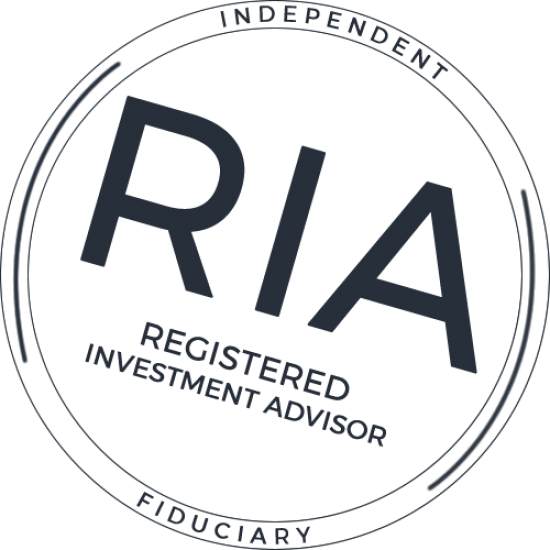FAQ
A fiduciary places client interests first, ahead of her own, and is held to the highest standard of care, higher than the “suitability” standard of care, which is what an advisor who is not a fiduciary is required to uphold. Sounds basic but not all financial professionals work as a fiduciary. We do.
A fiduciary has the highest ethical obligations to put your interests ahead of their compensation and any other considerations. Believe it or not, most financial professionals are not held to this standard and are only required that their recommendations are “suitable”, a loosely-held definition. This can sometimes result in conflicts of interest, and people being sold products to generate higher commissions. We look forward to the day that all financial advice is provided under the fiduciary standard.
This is a very good question. We strive to develop long-term relationships with all our clients, so you can rest assured that you always have a trusted advocate standing with you throughout life’s many chapters. It's important you're able to adequately determine our compatibility from the outset, and as such we endeavor to be totally transparent with you about our approach. You would be a good fit for us if: • You’re interested in a long-term partnership with a proactive team dedicated to helping you organize your financial life and keep it that way. • You’re looking for a partner to help you make sense of your present state of financial affairs, and to help you see what the future might look like based on what you have in place today.
- You’re willing to let go of the illusion of market timing. It’s clear that market timing is a fool’s errand, so we follow a disciplined investment process to save our clients from making incredibly costly behavioral investment mistakes that make up for our fee in years, if not decades.
- You’re willing to meet at least annually and return our phone calls so we can keep each other up to date.
- You value advice from professionals and recognize that value comes at a cost.
Our fees are simple and transparent. We charge a tiered Assets Under Management (AUM) fee stated as a percentage. The tiers are structured so that the overall percentage decreases as the account size increases. This fee is charged quarterly and deducted from each account at the beginning of each quarter, based on the value of the account at the end of the preceding quarter. The fee is disclosed as a line item on the quarterly statement and collected by the custodian, so you do not have to write a check, and any fees coming out of an IRA account are being paid with pre-tax dollars, which is a nice allowance by the IRS. The total annual percentage starts at 1.25% for our smallest sized account, billed at .3125% per quarter, but most of our clients pay about 1% annually, billed at .25% per quarter. We use only low cost investments like institutional share class mutual funds or very low cost ETF’s and our team of investment professionals operates as fiduciaries, never taking a financial incentive from the investments they manage.
Financial Planning services are billed at $200/hr.
This is an important question. There are so many great tools for those people who want to handle their own investing and financial planning. However, most people have a tough time implementing their plan consistently. According to DALBAR, the respected research organization that studies investor behavior and publishes a report each year since 1994 to compare investor behavior with the market, the average investor (both bond investors and equities investors) grossly and consistently underperforms the market. For example, in the 30 years through December 2018, the average bond investor earned .26%, annualized, compared to 6.1%, annualized, by the Bloomberg-Barclays Aggregate Bond Index for that same period. Stock investors underperformed the S&P 500 returns by 5.88%, annualized, over the same 30 years. And that’s just the beginning of the problem with doing it yourself.
While some people may be able to research a great fund, or do their own taxes, the key is tying together all the important pieces without missing one. Taxes, insurance, employee benefits, investments, cash flow and retirement planning, estate planning, the proper handling of Net Unrealized Assets (NUA) and so much more.
The reason our clients choose to work with us and pay for our services is because there is a lot to learn. And the cost of making a mistake is high. What if you didn’t save enough to cover for inflation before and during retirement or you didn’t estimate properly the cost of Medicare? How do you know if you’re really saving enough? Or if you’ve saved enough to retire? Should you work another year? Or more? Does your savings cover for all the spending you need to do in retirement? When is the best time to file for Social Security – not just in general but in your case? What if you pay off your mortgage at retirement with your 401(k) and you end up running out of money and you must sell your house anyway? When is the right time to sell during a market correction? Or is there a right time? Should you consider a Reverse Mortgage or is that a bad deal? When should you downsize? How do you properly handle company stock so that you get the special capital gains tax treatment allowed instead of having it taxed like the rest of your 401(k)? When will you get the next “trigger event” for that and what are the pitfalls? What about tax planning – should you convert to a Roth now or wait and if you do, how much is best for your personal situation and what are all the factors to consider? Do you have to take an RMD from your Roth 401(k) and if so, is there a way to legally avoid that? Will a Qualified Charitable Donation be helpful now that the tax laws have changed, and you won’t be itemizing? How does the SECURE Act impact you and should you use a trust for your IRA money knowing that trust tax rates are very high and the stretch provisions for IRA’s have been eliminated for almost everyone?
All of these questions might have their own separate isolated answer, but how do you weave together all of these pieces since each may have an opposing consideration that may offset the benefit of another for your personal situation? There is no one size fits all answer and it’s hard to Google your way to financial security.
The questions to ask yourself are:
- Can our professional investment management, financial planning, and tax planning bring at least an additional 1% - 1.25% return to you per year over the life of your portfolio than you could do on your own?
- Can we save you the equivalent of 1% - 1.25% a year in time, effort, worry, and record-keeping?
- Can we save you more than our fee each year in the cost of the mistakes we help you avoid?
Our clients choose us because they don’t want to get it wrong. They want a partner they can trust. Professional investment management and financial planning often prevent dozens of potential mistakes – any one of which pays for that fee for years, if not decades.
One way to look at it is to ask yourself if you think it’s possible that you’ll have more money or a bigger nest egg or net worth by having a financial professional involved even after paying the advisory fee. In many cases, we find that people are unknowingly paying high fees within their investments (like in 401k’s) that we can cut out, but they are not receiving any help and their portfolios are inefficient.
If we are able to help our clients save what they need to save, spend what they want to spend, and invest what they need to invest to help create the life they want to live, how much is that worth to them?
Between tax law changes, IRS requirements in retirement, investments, legal issues with estate planning – not to mention just priority setting and having a clear vision of the future – there’s a lot to know and to keep organized and on track. And it takes a lot of time. We think the cost of getting it wrong is high, and our clients agree.
As an independent registered investment advisor, Blueprint Financial Consultants can provide truly objective, expert advice. With no affiliations or limitations, we can select from the best resources, and latest technology, regardless of where they’re held, to help you reach your goals. This ability to act as true advocates for the families we serve allows us to provide a financial planning experience based on what’s important to them and not the firm we work for.
Also, being a local, boutique planning firm has its ancillary benefits. I invest heavily in our community, you can see me coaching soccer or running Girl Scout meetings, volunteering at our kid's school, working with local charities, picking up trash, etc. I remember when I was just starting out, oftentimes advisors could hide behind fancy conference rooms and what not to project “wealth”. Well, I work from the house that I own, you can see my car in my driveway, etc. We are nothing but authentic, full transparency around here.
Videos

Securities offered through Charles Schwab & Co., Inc. Member FINRA/SIPC.
To Check Firm or Individual Backgrounds please go to http://adviserinfo.sec.gov.
Copyright ©
Blueprint Financial Advisors | Powered by AdvisorFlex
